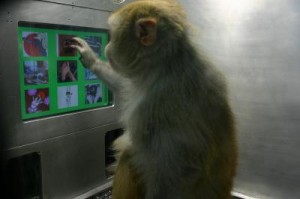A large part of human humour depends on understanding that the intention of the person telling the joke might be different to what they are actually saying. The person needs to tell the joke so that you understand that they’re telling a joke, so they need to to know that you know that they do not intend to convey the meaning they are about to utter… Things get even more complicated when we are telling each other jokes that involve other people having thoughts and beliefs about other people. We call this knowledge nested intentions, or recursive mental attributions. We can already see, based on my complicated description, that this is a serious matter and requires scientific investigation. Fortunately, a recent paper by Dunbar, Launaway and Curry (2015) investigated whether the structure of jokes is restricted by the amount of nested intentions required to understand the joke and they make a couple of interesting predictions on the mental processing that is involved in processing humour, and how these should be reflected in the structure and funniness of jokes. In today’s blogpost I want to discuss the paper’s methodology and some of its claims.
Tag: theory of mind
Animal Cognition & Consciousness (II): Metacognition & Mentalizing
As I wrote in my last post, three kinds of behaviours are most often discussed in debates about animal consciousness and cognition:
“1. Mirror self-recognition
2. Tests of metacognition;
3. Metacognition of others’ mental states” (Gómez 2009: 45)
After having discussed the first capacitiy in my previous post, I will discuss the latter two in this post, starting with metacognition, that is being aware of one’s own knowledge states, and then turn to being aware of other’s mental states.
Metacognition.
Being aware of one’s own mental states, i.e., reflective consciousness, surely seems to be one of the most crucial components of self-awareness. In one paradigm used to test for metacognitive awareness, monkeys were trained to select, out of a number of two or more images, the one that is identical to an image they have been shown earlier. As is to expected, the monkeys’ performance progressively deteriorated the longer the delay was between the sample image and the selection task.
Continue reading “Animal Cognition & Consciousness (II): Metacognition & Mentalizing”
Theory of Mind and Language Evolution; What can psychopathology tell us?
Theory of Mind is the ability to infer other persons’ mental states and emotions. It is thought to have evolved as part of the human’s social brain and probably emerged as an adaptive response to increasingly complex primate social interaction.
Brüne and Brüne-Cohrs (2006) explore the ‘evolutionary cost’ of language evolution:
This sophisticated ‘metacognitive’ ability comes at an evolutionary cost, reflected in a broad spectrum of psychopathological conditions. Extensive research into autistic spectrum disorders has revealed that theory of mind may be selectively impaired, leaving other cognitive faculties intact. Recent studies have shown that observed deficits in theory of mind task performance are part of a broad range of symptoms in schizophrenia, bipolar affective disorder, some forms of dementia, ‘psychopathy’ and in other psychiatric disorders.
Now it’s fairly uncontroversial to assert that without the ability of theory of mind humans would have never evolved language (Sperber and Wilson, 2002). This is due to the fact that if one can’t attribute another to have a ‘mind’ like ones own, or assume that other minds hold different information to ones own then one would see little point in trying to share information. (I’m sorry for the amount of ‘ones’ in that sentence).
Sooo, it does not seem presumptuous to assume that people interested in the evolution of language should be interested in theory of mind, in fact for many years evolutionary linguists, psychologists and biologists have been looking into this, but mostly through observing the behaviour of animals, and especially primates to see if they display theory of mind capabilities. A good summary of this work can be found here, and a lot of relevant studies can be found on this blog in the What makes humans unique? posts by Michael. I’m not going to look at the animal data in this post, but instead what the deficiencies in some human conditions can tell us about the evolution of theory of mind. That is, what can autism, schizophrenia, bipolar affective disorder, dementia, ‘psychopathy’ and other psychiatric disorders tell us?
Continue reading “Theory of Mind and Language Evolution; What can psychopathology tell us?”



